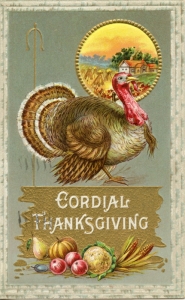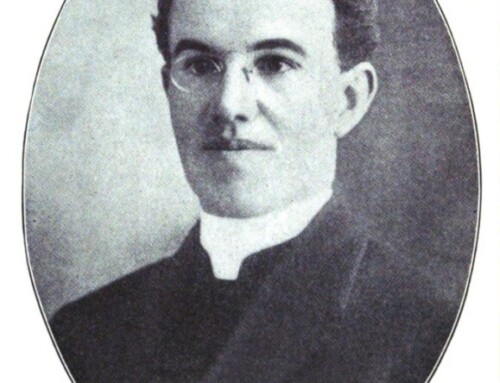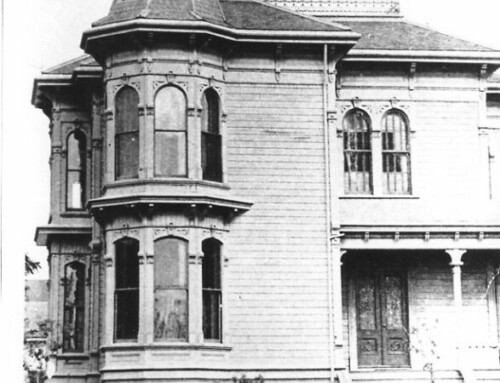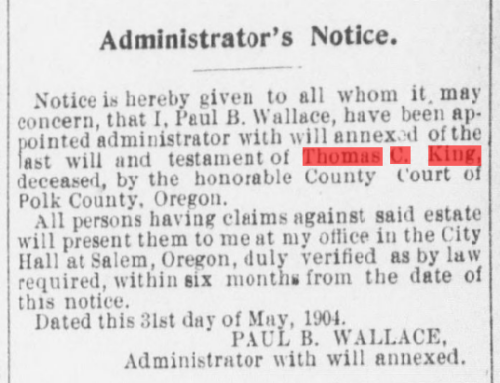“Governor Pennoyer is an original, if a somewhat irreverent humorist. He is the first executive in the history of the country to get even with his political enemies in a Thanksgiving proclamation,” proclaimed the Morning Oregonian November 2, 1893.
It started off innocently enough from the general public’s perspective. The governor’s annual Thanksgiving proclamation published November 1, 1893 in all the state’s major papers. Perhaps a tad early, but routine and expected.
“I do hereby appoint the fourth Thursday of the present month as a day of Thanksgiving to Almighty God for the blessings He has bestowed upon this Commonwealth during the present year. God has indeed been most beneficent to our State and nation.”
And then Governor Sylvester Pennoyer climbed up on his soapbox, figuratively speaking.
“And yet unjust and ill-advised congressional legislation, having made gold alone a full legal tender money, has so dwarfed and paralyzed business that the bounties of Providence are now denied to hundreds of thousands of people within the national domain, who not only are without employment, but also without the means of procuring food, raiment and shelter.”
It had been no secret up to this point in his political career the position Pennoyer had taken regarding the evils of repealing the Sherman Silver Purchase Act and the subsequent switch to gold as the government standard. But just in case his audience was in doubt, he followed up with this impassioned plea and political jab at the national administration.
“While, therefore, the people of Oregon return thanks to God for His goodness, I do most earnestly recommend that they devoutly implore Him to dispose the President and Congress of the United States to secure restoration of silver as full legal tender money, in accordance with the policy of the fathers of the republic….”
But as impassioned as his proclamation may have been, the real act of rebellion became clear after President Cleveland’s national proclamation two days later on November 3, 1893, upon careful examination of a calendar. Governor Pennoyer’s proclamation designated the 4th Thursday, November 23rd, as the Thanksgiving holiday. President Cleveland’s official statement named November 30th, the 5th Thursday. The battle lines had been drawn.
An uproar was heard across the nation. From Milwaukie, Wisconsin a rather tongue-in-cheek observation, “Governor Pennoyer, of Oregon, has appointed a day of prayer and thanksgiving…to dispose the president and congress of the United States. Who says that secularity and religion in this fair land are not joining hands?” The gloves came off in Chicago with the editorial statement Pennoyer is a “gubernatorial freak with execrable taste and bad manners and his proclamation an outrage…. Illinois extends her most profound sympathy to Oregon.” From New York, “Governor Pennoyer has again displayed his impudence… and ignorance in a Thanksgiving proclamation. The people of Oregon ought to pray for wisdom to elect a better governor.”
Perhaps a little background history will provide insight into the enmity between the gentlemen. Pennoyer was well into his second term as Oregon’s Democrat-turned-Populist governor when Cleveland was elected. In 1893 he ordered the state’s ceremonial cannon locked away and placed under armed guard in order to prevent state Democrats from using it to fire a salute in celebration of Cleveland’s inauguration as president. A few months later he refused direct orders from President Cleveland to use his resources to protect Chinese Americans after the extension of the Chinese Exclusion Act of 1882. His infamous telegraphed response to the president read, “Washington: I will attend to my business. Let the president attend to his.” But of course, Pennoyer’s most notable and memorable act may well have been moving Thanksgiving Day in Oregon one week ahead of the national holiday not just once in 1893 but again in 1894.
So, what’s a good law-abiding citizen to do? Eat turkey twice? Thank heaven turkey was plentiful and cheap that year, according to the Albany Herald newspaper. Let’s turn to the Oregon Statesman paper dated November 23, 1893 for a first-hand report of Pennoyer’s Thanksgiving here in the capitol city. Spoiler alert: the children don’t get two holidays.
“THIS DAY – Today is a legal holiday, made so by the proclamation of Governor Pennoyer who decided that the fourth Thursday in November of this year was the one to be observed as a day for thanksgiving in Oregon. All the offices at the capitol will be closed to business as well as those at the courthouse. The public schools will continue in session as usual the directors having decided that Thursday, the 30th, was the proper time for them to be closed it being proclaimed a national day by the president. At the penitentiary the convicts will be treated to a Thanksgiving dinner with turkey, chicken, and mutton, as the principal “dishes” to be served. At the insane asylum Superintendent Rowland will give the inmates a treat in the shape of a turkey dinner, enough of this kind of poultry having been slaughtered to make the required amount – 903 pounds. Other delicious eatables will be served. The national day will also be remembered and a big dinner will again be prepared at both these institutions.”
“In Salem the day to be religiously observed this year will be the 30th. The Ministerial association held a meeting yesterday and so unanimously decided. The faculty of Willamette also met yesterday and decided to observe the 30th only as a holiday. But in Oregon both days will be legal holidays and both will be non-judicial days.”
This article was written by Kaylyn F. Mabey for the Statesman Journal where it was printed 22 November 2015. It is reproduced here for reference purposes.
References:
- Morning Oregonian (Portland, OR) – November 2, 1893, p. 4
- Oregon Statesman (Salem, OR) – November 24, 1893, p. 12
- Oregon Statesman (Salem, OR) – November 10, 1893, p. 4, 8
- Historic Oregonian – November 1893, multiple issues







